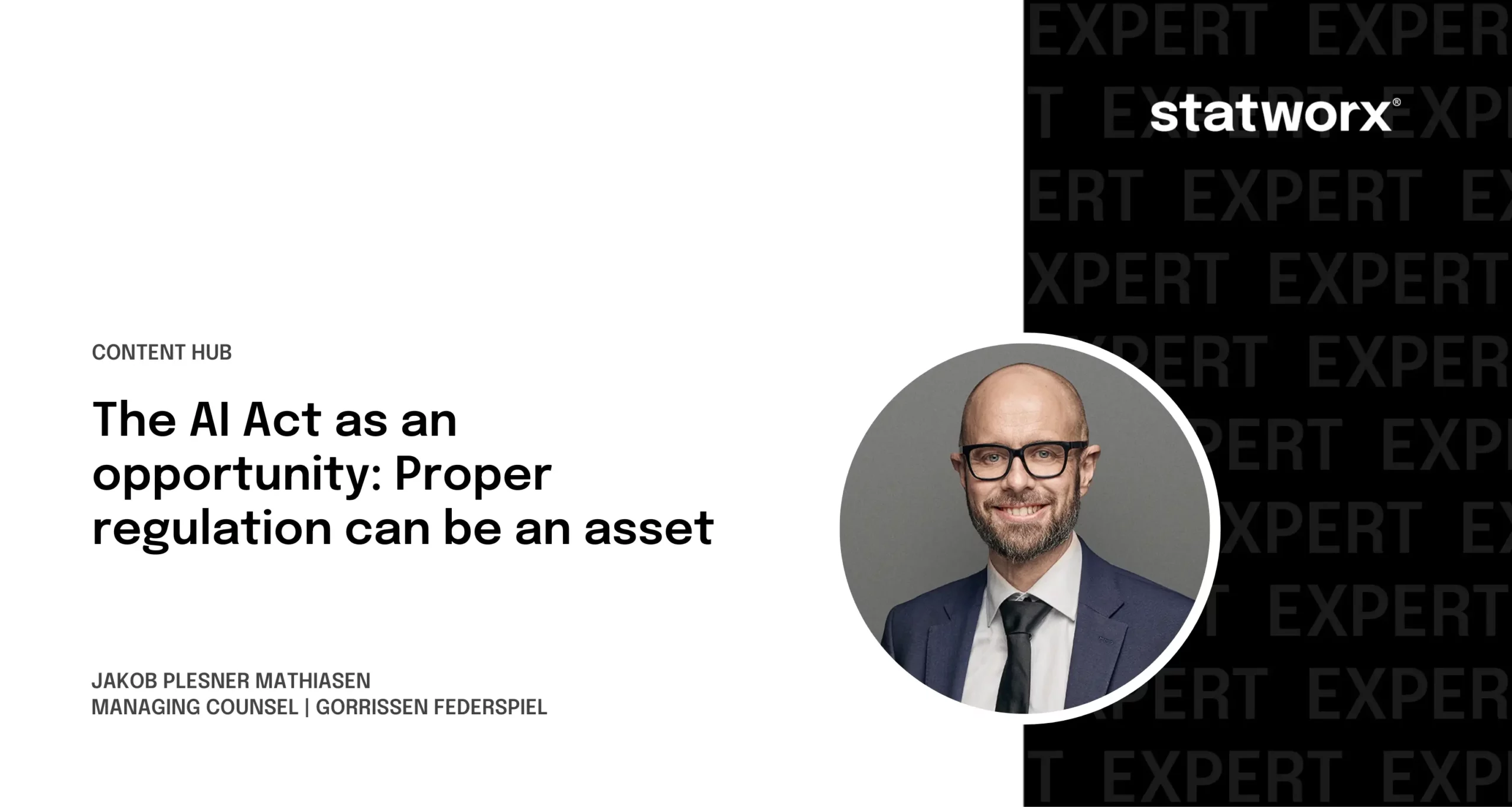Expert Interview
Our Content Hub is expanding and evolving! In order to provide our valued readers with even more high-quality expertise and relevant content, we regularly conduct interviews with experts on fascinating topics related to artificial intelligence, data science, machine learning, and related fields. If you consider yourself an expert in these areas, please don’t hesitate to reach out to us. We are constantly exploring new opportunities for collaborations and look forward to uncovering shared synergies that can lead to engaging expert interviews. Feel free to contact us at: blog@statworx.com
About Gorrissen Federspiel 
Gorrissen Federspiel is one of the leading commercial law firms in Denmark and has excellent international connections. The firm acts as a trusted advisor in all aspects of corporate law. Gorrissen Federspiel attaches great importance to legal tech in order to optimize work processes and improve its own advisory services.
1. Please introduce yourself.
My name is Jakob Plesner Mathiasen, and I am an attorney specializing in intellectual property law and new technologies, particularly AI. My primary focus lies at the intersection of emerging technology and IP law, where I explore and address the unique legal challenges that arise.
2. What new intellectual property (IP) challenges have arisen for your clients with the advent of GenAI?
The first key issue is whether training AI systems requires permission from rights holders. Most generative AI models are trained on vast amounts of data. Often, this material is copyrighted, and the training occurs without prior permission from the rights holders. The key question is whether this training requires permission. In the US, the fundamental issue is whether it constitutes “fair use”. In Europe, it revolves around whether the rules on text and data mining are applicable and if their conditions are met.
The second key issue involves determining if and when using AI systems necessitates permission. The third question is whether AI-generated outputs can be protected by copyright and the implications if they cannot be. However, these are just the tip of the iceberg. There are many more relevant areas, ranging from privacy concerns to marketing regulations.
3. With GenAI providers such as OpenAI facing legal challenges, such as the recent case with the New York Times, what are the potential intellectual property risks for users of ChatGPT and similar tools?
The New York Times case concerns whether OpenAI could use articles from the New York Times in training and developing ChatGPT. If it is considered fair use, then usage could proceed without permission. If not, rights clearance and payment to the New York Times would be required. Additionally, the Times presented examples where ChatGPT seems to have memorized their articles, asking ChatGPT to rewrite whole or major parts of these articles. Thus, the case also concerns the legality of this memorization.
Regarding the users of generative systems, both consumers and businesses, different issues come into play. The use of AI systems may lead to IP challenges if not properly managed. A user might upload reference material (such as PDF files) to their GPT model, allowing it to tailor responses based on that material. This can be problematic if the material is copyright-protected. Users could also infringe on copyrights by asking the AI to imitate something that is protected. Hence, it’s essential for companies to thoroughly understand their data flow and usage, and to establish appropriate employee policies. This approach is vital for both IP and privacy considerations.
4. The EU AI Act and related regulations are pushing for increased transparency in AI. How are these evolving IP laws expected to impact the day-to-day operations of European businesses?
The AI Act and related regulations are set to increase AI transparency. This means businesses must comply with these requirements. It might be beneficial for companies to adapt their services now to be prepared and avoid big changes later. From a business perspective, transparency isn’t necessarily negative; it provides certainty and stability about the system. Indeed, security might become a key factor in businesses’ willingness to use AI.
5. How do you envision Europe leveraging clear and fair AI laws as a competitive advantage in the global market, balancing innovation with regulation?
The AI Act is the first real regulation of AI, with the EU leading the way. Some have been critical of the legislation being a disadvantage for the development of AI services in Europe. This is partly due to fears of increased costs to comply with the legislation, less flexibility compared to other countries (notably the USA), and that it could limit startups’ opportunities to enter the market. On the other hand, there are also many good arguments that regulation can be a competitive advantage. The legislation provides assurance about the use of AI, both from a legal and ethical standpoint. Many are uncertain about the use of AI today, and there are numerous lawsuits on the issue. In this context, the legislation could play a beneficial role. It has the potential to foster wider acceptance and usage of AI systems, while addressing and diminishing concerns among users. If implemented correctly, these laws can be turned into an advantage. There’s a misconception that regulation stifles growth, but that’s not always the case. Proper regulation can actually be a benefit, providing security and trust for users, which are key in the use and selection of AI.
statworx Kommentar
The debate about AI and Intellectual Property (IP) revolves around whether or how models like ChatGPT, Gemini, and others may utilize content they have extracted from the internet or books for their training. Notable authors such as Sara Silvermann and George R.R. Martin have sued OpenAI. Essentially, it is believed that there will be no retreat in the use of LLMs and their reliance on publicly available material for training. Simultaneously, intellectual property rights are upheld equally by regulatory authorities in the US and EU, and those feeling deprived of their content are unlikely to relent swiftly. Ultimately, a combination of legal rulings and preventive agreements is expected to shape the landscape in 2024, possibly even with force, akin to the standoff between Google and Australia in 2021. Additionally, it is evident that companies are highly distrustful of utilizing AI with unclear IP usage, thus presenting an opportunity for those who can establish robust agreements in this realm.
statworx recommends that anyone who is unsure about this should act early. You can use our free AI Act Quick Check to make an initial assessment of how the AI Act will affect your company today. Determine the risk class of your AI systems based on just a few questions and get ready for the future!
If you would like to discuss the requirements and challenges in more detail, statworx offers a a non-binding initial consultation.

